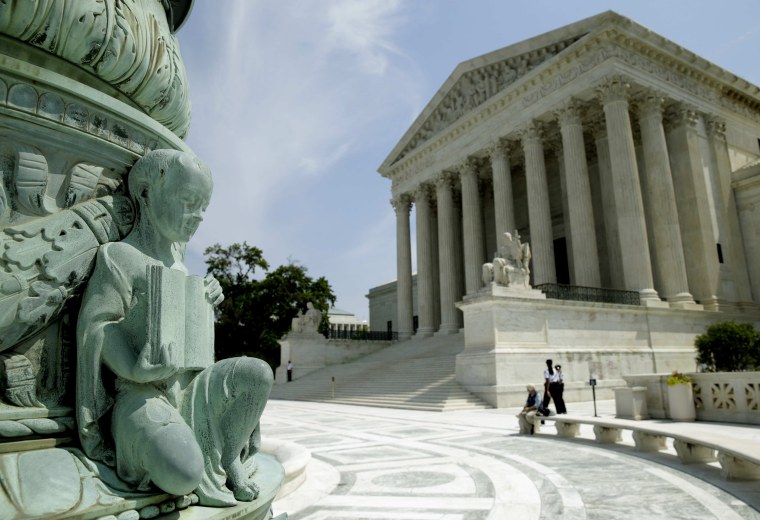First Read is a morning briefing from Meet the Press and the NBC Political Unit on the day's most important political stories and why they matter.
How the Supreme Court could make things easier -- or harder -- for the GOP
Later this month, the Supreme Court is set to deliver rulings on two cases -- on health care and gay marriage -- that could have a profound impact on the 2016 issue terrain. And here is the growing political reality: The court could either make things much easier for Republicans, or much harder. On health care, the court ruling that subsidies for states with federal marketplaces are illegal would affect nearly 6.4 million Americans and increase their health costs by almost 300%. That could create a potential PR nightmare for congressional Republicans and GOP governors. Why? Well, don't take our word for it. Take Sen. Ron Johnson's, who said back in April: “[Obama will] have the ads all racked up with the individuals that have benefited from Obamacare on the backs of the American taxpayer.” As John Ullyot, a GOP strategist and former Senate aide, told The Hill newspaper: “The politics of the King vs. Burwell case are extremely treacherous and tricky for Republicans because if the subsidies are thrown out by the court, Republicans are in the position of having to create a fix that would be seen as a problem by their most conservative supporters.” Bottom line: The court upholding the subsidies -- which is seen as a 50%-50% prospect, if not higher -- would be a safer outcome for Republicans, because they wouldn’t have to own (or partly own) a fix over which their party is deeply divided.
The court could either take gay marriage off the table, or put it on the ballot in 2016
Meanwhile, the other Supreme Court decision that could play a role in 2016 is the case about whether there should be a constitutional right for same-sex marriage. Why could that have that an impact? The court ruling that there is a constitutional right could potentially take gay marriage -- supported by roughly 60% of Americans, according to polls -- off the table for Republican presidential candidates. Some of them could say, “I adamantly disagree with the court’s decision. Marriage is something the states should decide, not the Supreme Court. But the court has spoken, and it’s time to move on.” Conversely, if the court rules that gay marriage is NOT a constitutional right and must be decided by the states, that could possibly lead to a situation where states (including presidential battlegrounds) put gay marriage on the ballot in 2016. That would mark a 180-degree turn from 2004, when gay-marriage BANS were used as a wedge issue to drive conservative voters to the polls. Remember, it is possible that the Supreme Court decides that states don’t have to legalize gay marriage, but that they have to recognize gay marriages established in other states. That outcome would also likely lead to the ballot referenda reaction we described above.
The court also will decide whether independent redistricting commissions are valid
There’s one other Supreme Court decision this month that could have a big political impact -- on redistricting. As our colleague Pete Williams reminds us, the court is deciding whether Arizona’s independent redistricting commission is valid, or whether redistricting should be done solely by state legislatures. Arizona and five other states (California, Hawaii, Idaho, New Jersey, and Washington) all have set up independent commissions to conduct their congressional redistricting. So the court striking down Arizona’s system could be a HUGE setback to redistricting reform. In other words, gerrymandering could become even harder to stop.
Who makes the debate cut -- and who doesn’t
After mounting criticism of Fox News’ participation rules for its August GOP primary debate, the network announced that it will host a forum earlier on the same day for candidates who fail to qualify for the evening’s primetime event. Fox’s rules still limit the evening’s main event to the Top 10 GOP candidates as measured by the average of the most recent five reputable national polls. We crunched the numbers and calculated who would make the cut if the debate were held today – and who is still stuck at the kids’ table. (Note: The polls used are May surveys from CNN/ORC, ABC/Washington Post, Quinnipiac University and two from FOX News.)
Here are the top ten candidates, by polling average:
- 1. Jeb Bush – 11.6%
- 2. Scott Walker – 10.8%
- 3. Marco Rubio – 10%
- 4. Ben Carson – 9.8%
- 5. Mike Huckabee – 9%
- 6. Rand Paul – 8.4%
- 7. Ted Cruz – 7.2%
- 8. Chris Christie – 5%
- 9. Donald Trump – 4%
- 10. Rick Perry – 2.8%
And here are the candidates who don’t make the cut: Kasich (2.0%), Santorum (2.0%), Fiorina (1.6%), Pataki (1.2%), Graham (1%), Jindal (0.8%)
Big trade vote set in House for Friday
“House Republican leaders are preparing a major two-day debate and ultimate showdown vote Friday on President Barack Obama's trade agenda, despite heavy Democratic opposition,” the AP writes. A snag that has upset Democrats: “A Senate-passed bill now facing the House would divert money from Medicare to fund the job retraining program. But House Democrats call that unacceptable, and demand another funding source. Republicans agreed, but insisted on putting the alternative funding mechanism in a trade bill separate from the fast-track measure. They are desperate to avoid changing even a comma in the fast-track bill, because that would send it back to the Senate and give opponents another chance to filibuster and throttle it there.” As the Washington Post’s Paul Kane observes, House Republicans are daring Democrats to torpedo Obama’s trade agenda over this Medicare issue, forcing them to stew over Dem-vs.-Dem press coverage.
Click here to sign up for First Read emails. Check us out on Facebook and also on Twitter. Follow us @chucktodd, @mmurraypolitics, @carrienbcnews



